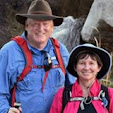I was born and lived a few early years in north central Arkansas - - the hilly part. I briefly went to school there (small town of Leslie). My family then moved to a farm near another small town, Findlay, in east central Illinois. I grew up, graduated from a nearby state university, and spent half my life in those Midwest flatlands. But I've always loved mountains, forests, and rivers.
Annette was born in Ames, Iowa and has family roots in rural west Iowa farm country. Growing up in her early years, her father was first in the Air Force followed by employment with General Electric. The family moved around the country to assignments in Long Beach, St. George, Winslow, and Biloxi followed by Louisville and Schenectady before returning to Iowa. But frequent vacation trips to Estes Park and Rocky Mountain National Park also imprinted her with a love for mountain landscapes - - that and she was / is a big fan of John Denver.
Annette and I have visited West Virginia a number of times. We have rafted down the New River, peered down the foggy canyon gorge at the bridge, hiked and biked a few mountain trails, viewed awesome waterfalls, and driven some backroads in that unique and beautiful state. For decades, the land and water have been threatened. This song parody points to today's continuing problems facing the coal-laden mountain area:
A recent court decision poses increased threats to the terrain, streams, and people living in the Appalachian Mountains by expanding the number of permits for mountaintop removal coal mining. Mountaintop removal is pretty much just that - - tear the top of the mountain by first bulldozing away 500 to 1,000 feet of overburden to get to the coal seams. Then the mountain is blasted down with explosives to allow enormous dragline excavating equipment to move the rubble aside and remove the coal. The pulverized remains of the mountain ends up filling streams and valleys. Mountaintop removal mining is only used for about 5 percent of coal mining today, but the area impacted is huge. In the Appalachians over 400 peaks have been leveled so far. By next year the EPA predicts that this coal mining method will have destroyed about 1.4 million acres - an area larger than the state of Delaware. Representatives Frank Palone (NJ), John Yarmuth (KY), and Dave Reichert (WA) recently re-introduced a Clean Water Protection Act, the HR1320 CWPA bill. HR1310 reverses a 2002 Bush Administration decision that defined the toxic rubble left from Mountaintop Removal Coal Mining as 'fill material' that could then be dumped into valleys that are the headwaters of Appalachian riverways. In the video below, Ashley Judd speaks out against mountaintop mining and makes a fervent plea for help.
Here in our adopted home in the Rocky Mountain West, there are similar extractive threats to the landscapes, natural resources, and way of life. As a 'moved-in" resident, I try to maintain a grounded viewpoint recognizing that just by purchasing and building our home here - - we too made a significant impact on the land. We cleared areas and altered the landscape for our driveway and the homesite. We had a water well drilled and installed a septic system, and underground electrical, phone, and water lines. That's invasive!
We strive to be good stewards and good neighbors. We have cut out dead trees, trimmed branches, and removed undergrowth in order to reduce the fire fuels on our high desert land. We sought and were given lots of help from the Utah Division of Forestry, Fire and State Lands; qualified for an in-kind grant for wildfire hazard reduction. Advocates for the environment (like ourselves to some degree) need to examine our positions, meet and listen to our neighbors, and try to gain a 'bigger picture' when dealing with local land use issues.
I recommend a book written by friend and neighbor, Stephen Trimble: Bargaining for Eden: The Fight for the Last Open Spaces in America (2008). There is a brief and important excerpt at High Country News: Credo: The People's West (June 23, 2008).
Saturday, February 21, 2009
What is it about mountains and flatlanders?
Subscribe to:
Post Comments (Atom)




Y'all need to watch The Unforeseen. It's about the real estate development and environmental issues surrounding Austin, Texas (scope of about 30 years). However, the story is universal (as discussed by Robert Redford... one of your Utah residents.)
ReplyDelete